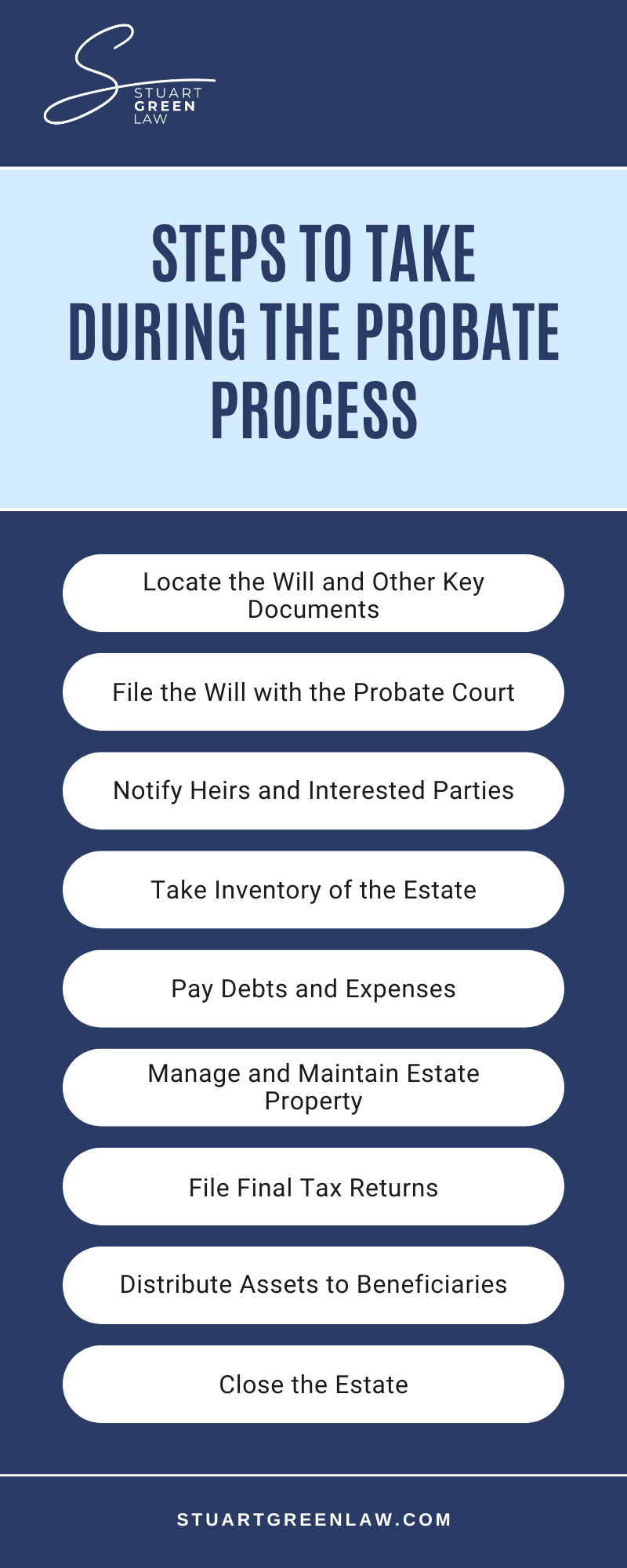
Our Attorneys Streamline The Texas Probate Process
When you’re overwhelmed with the grief and loss of losing someone you love, the last thing you feel equipped to do is to manage the practicalities of managing and dispersing their estate. Unfortunately, this isn’t something you can put off forever or even for a few weeks. Your loved one’s assets must be distributed according to their estate plan (if they had one) and debts properly settled. Administering an estate and completing the Texas probate process can be complicated, but with the advice and guidance of our Houston, TX probate lawyer, it doesn’t have to be.
The attorneys at Stuart Green Law, PLLC assist with every aspect of the probate process, from answering questions you have as the executor of your family member’s will to acting as an estate administrator in your stead. Our deep understanding of Texas probate laws and its precise legal requirements makes us uniquely qualified to address all of your corporate needs. Please contact us today to discuss your probate concerns.
What Does A Houston Probate Lawyer Do?
A probate lawyer manages the legal process of settling a deceased person’s estate. Probate involves a number of specific, well-documented steps, from transferring property and assets to evaluating any creditor petitions and paying all valid debts. There’s also a considerable amount of paperwork required by the courts and the IRS. Usually, the probate process is managed by the estate’s representative, who is named in the deceased’s will as its executor. If you have been designated executor of a family member’s will and don’t know where to start, we can walk you through the entire process.
If no will exists, Texas intestacy laws determine how the estate is distributed. The county probate court in the county where your loved one died will appoint an administrator to take on this role, usually their next closest, available kin. If you’ve been appointed as an estate administrator, we can serve you in the same way as if you had been named in the will.
With the help of our probate attorneys, you can effectively complete everything from opening the estate in probate court to notifying creditors and heirs, inventorying property, determining asset values, and paying off legitimate debts. There are legal procedures that must be followed carefully. Any error or omission delays the process or could even lead to legal problems for the executor. Our experienced legal team is here to make sure nothing slips through the cracks.
We Guide You Through The Texas Probate Process
Probate is usually just a tedious, time-consuming processing of assets and settling debts—but not always. Sometimes there’s a problem. A family member or other interested party may contest the will, claiming it’s invalid or that the deceased was under undue influence when it was created. Or, someone may feel they were unfairly left out or deserve a larger share of the estate. Not only do these disputes cause serious legal problems, but they can also damage your family relationships. Our Houton probate lawyer can step in and handle the legal matters, shielding you from any (unfair) blowback from dissatisfied kin.
Effectively completing the Texas probate process requires a great deal of time, attention to detail, and an understanding of Texas probate statutes. Our firm delivers. Please contact Stuart Green Law, PLLC, today for a professional consultation about your probate matter.
Types Of Probate Problems We Handle
At Stuart Green Law, PLLC, our Houston, TX probate lawyer helps families work through probate issues that can cause stress, delay, or conflict. Probate can involve several steps, and when problems arise, it can make an already difficult time even harder for those left behind. We work closely with clients to keep the process moving and resolve disputes efficiently. We have attorneys licensed in Texas, Pennsylvania, Kentucky, and South Dakota, so we know how to offer diverse solutions to our different clients. Below are some of the common probate issues we help handle.
Delays In The Probate Process
Probate can be slow, especially if paperwork is missing, deadlines are missed, or required steps aren’t completed correctly. We help move the process forward when things stall or become stuck in court.
Missing Or Invalid Will
If a will can’t be located or the document is missing signatures or appears to be outdated, our Houston probate lawyer knows that it can create confusion and disagreement. We help determine the proper course of action when a valid will is in question.
Will Contests
Disputes over whether a will was made under pressure, when someone lacked capacity, or if the document is a forgery can lead to serious court battles. We represent heirs, beneficiaries, and personal representatives when these issues arise.
Executor Misconduct
An executor may mishandle funds, delay distributions, or act without proper authority. If you’re concerned about how an estate is being managed, we can step in to help address the problem or seek their removal.
Unclear Or Conflicting Will Provisions
Sometimes a will contains terms that contradict each other or are hard to interpret. We work to clarify what the decedent intended and help courts resolve unclear provisions so the estate can be settled. These disputes can lead to legal challenges or cause confusion for executors and heirs trying to follow the will.
Debt And Creditor Claims
When debts or creditor claims appear after someone passes away, they must be addressed properly. We help evaluate which claims are valid and how they affect the estate’s assets before distributions are made. Failing to handle claims correctly can lead to lawsuits or personal liability for the personal representative.
Taxes And Reporting Errors
Estate taxes and financial reporting can be easy to get wrong, and mistakes can lead to penalties or delays. We help correct reporting errors and avoid future problems with tax filings during probate. Accurate financial records are essential to closing the estate and protecting the executor from potential issues with taxing authorities.
Attorney Stuart A. Green is the founder and managing attorney at our firm, and we know probate can bring up legal and personal challenges during a time of grief. Our firm is here to help guide families through those problems with clarity and a steady hand. If you’re facing any probate issues or concerns, reach out to Stuart Green Law, PLLC. Our Houston probate lawyer is ready to help you move forward with confidence.
Steps To Take During The Probate Process
If you’ve recently lost a loved one and are facing the probate process, our Houston, TX probate lawyer knows it can feel like there’s a lot to get done quickly. Probate is the legal process of settling someone’s estate after they pass away. Taking things step by step can make the process easier to manage. We serve clients domestically and abroad, so don’t hesitate to get in touch with our firm if you have any questions.
- Locate the Will and Other Key Documents. The first thing you should do is locate the decedent’s will, if one exists. You’ll also want to gather other important documents, such as life insurance policies, bank statements, titles, deeds, and trust documents. If no will is found, the estate will likely be handled under your state’s intestacy laws.
- File the Will with the Probate Court. Once the will is located, it should be filed with the probate court in the county where the decedent lived. This officially begins the probate process. If you are named as the executor in the will, the court will review the documents and may issue you “letters testamentary,” which give you legal authority to act on behalf of the estate.
- Notify Heirs and Interested Parties. Our Houston probate lawyer knows you’ll need to notify beneficiaries named in the will, as well as any legal heirs. Creditors must also be notified so they can submit claims against the estate if applicable. Many states require formal notice through mail or publication in a local newspaper.
- Take Inventory of the Estate. You should create a detailed list of all the assets owned by the decedent at the time of death. This includes real estate, personal property, bank accounts, investments, and other valuables. Some items may need to be appraised. The inventory must be filed with the probate court by a certain deadline.
- Pay Debts and Expenses. Before any inheritance can be distributed, you’ll need to pay off outstanding debts, taxes, and final expenses. This includes funeral costs, medical bills, and court filing fees. Valid claims from creditors should be paid from estate assets. If there are disputes about debts, the court may help resolve them.
- Manage and Maintain Estate Property. While the estate is open, you’ll need to safeguard and manage the decedent’s property. This could include maintaining a home, paying ongoing bills, and protecting assets from loss. You may also need to close accounts and sell certain property to cover debts or simplify distribution.
- File Final Tax Returns. You are responsible for filing the decedent’s final income tax return. In some cases, the estate may also owe estate or inheritance taxes, depending on the value of the assets and the laws in your state. Filing taxes properly is a critical part of closing out the estate.
- Distribute Assets to Beneficiaries. Once all debts are paid and the court gives permission, you can distribute the remaining assets to the heirs and beneficiaries according to the will or applicable law. Keep records of everything you distribute and have beneficiaries sign receipts.
- Close the Estate. After everything is distributed and all paperwork is complete, you can file a final accounting with the court and request to close the estate. The court will review everything and formally discharge you from your duties as executor or personal representative.
At Stuart Green Law, PLLC, we know probate can be a demanding responsibility. You don’t have to handle it all on your own. If you need help moving forward or want to make sure everything is completed correctly, reach out to our team. We also serve clients in Katy, Sugarland, Pasadena, and other local areas. Our Houston probate lawyer is here to provide steady, reliable support every step of the way.
Houston Probate Infographic
Houston Probate FAQs
Probate is the legal process of managing a person’s estate after they pass away. Our Houston, TX probate lawyer can tell you that it involves collecting assets, paying debts, and distributing property to heirs according to a will or state law. Many people have questions about how this process works and what steps are required. Attorney Stuart A. Green has helped clients both domestic and abroad, so trust that he can handle your case with care. Don’t hesitate to give the office a call when you want to move forward.
What Does Probate Involve And When Is It Required?
Probate is the process the court uses to oversee the administration of a deceased person’s estate. It is generally required when the person owned assets solely in their name without designated beneficiaries. This process verifies the will, if there is one, appoints a personal representative, and handles financial matters like debt repayment and asset distribution.
How Long Does The Probate Process Usually Take?
Our Houston probate lawyer knows that the time frame can vary depending on the size of the estate, whether there is a will, and if any disputes arise. In many cases, probate can take several months to a year. Larger or more complex estates may take longer. We help clients prepare the necessary documents and follow court timelines to move the process forward as efficiently as possible.
Who Is Responsible For Managing The Probate Process?
The court appoints a personal representative, sometimes called an executor, to handle probate duties. This person is often named in the will. Their responsibilities include identifying and valuing assets, paying valid debts, filing required tax returns, and distributing property to heirs. Working with an attorney can make it easier to understand these responsibilities and meet all legal requirements.
What Costs Are Involved In Probate?
Probate costs can include court filing fees, publication fees for required notices, and legal or accounting fees. The exact amount depends on the estate’s size and the state’s requirements. These costs are typically paid from the estate before any distributions are made to heirs or beneficiaries.
Can Probate Be Avoided?
In some situations, yes. Certain assets, such as life insurance policies or retirement accounts with named beneficiaries, do not go through probate. Jointly owned property with rights of survivorship also passes directly to the surviving owner. Additionally, creating a trust can allow assets to be distributed without going through probate court.
At Stuart Green Law, PLLC, we help families understand the probate process and complete each step with confidence. Whether you are serving as a personal representative or have questions about how probate applies to a loved one’s estate, we are here to guide you. Our firm has 5 stars on Google Reviews, so if you’re ready to get started, we encourage you to contact our Houston probate lawyer today so we can help you take the right steps to protect your interests and carry out your loved one’s wishes.
Probate Law Glossary
Houston, TX probate lawyer services often involve legal language that can feel unfamiliar. When you’re managing a loved one’s estate, it helps to have a clear understanding of key terms. Below, we explain five of the most important legal terms related to Texas probate law, so you feel informed and supported throughout the process.
Letters Testamentary
Letters Testamentary are official documents issued by a probate court that authorize the executor named in a will to act on behalf of a deceased person’s estate. These court-issued letters grant legal power to collect assets, pay valid debts, and distribute property to beneficiaries. Without this document, even someone named in the will has no authority to access accounts, sell property, or handle the decedent’s affairs. If you’re named as executor, receiving Letters Testamentary is one of the first steps you’ll take after the will is filed. The court typically requires a formal petition and a hearing before issuing the letters.
Personal Representative
A Personal Representative is the person legally responsible for managing the administration of an estate. In Texas, this can refer to either an executor (if named in a valid will) or an administrator (if there is no will or the named executor cannot serve). Their duties include locating assets, paying off valid debts, handling tax filings, and ensuring proper distribution of remaining property. Personal Representatives owe a fiduciary duty to the estate and its beneficiaries, meaning they must act in good faith and in the best interest of all parties involved. Failing to perform these duties properly can result in legal consequences or removal by the court.
Intestate Succession
Intestate Succession refers to the legal process of distributing a person’s assets when they die without a valid will. Under Texas law, this means that the estate will be divided according to a set hierarchy of heirs as defined by state statutes. Typically, spouses and children inherit first, followed by parents, siblings, and other relatives. The court will appoint an administrator to manage the estate, similar to an executor. If you’re facing a situation where no will exists, it’s essential to understand how Texas law applies to your family structure, as distribution might not align with personal or verbal agreements.
Independent Administration
Independent Administration is a simplified probate option available in Texas when the court allows the executor or administrator to manage the estate with minimal court oversight. This usually happens when the will explicitly permits it or all heirs agree to it. It can greatly reduce time and expense because it avoids repeated court hearings or approvals for routine actions, like selling assets or paying debts. However, the Personal Representative still has legal responsibilities and must notify beneficiaries and creditors, file inventories, and maintain accurate records. This method is one reason Texas probate is considered more efficient than in other states.
Will Contest
A Will Contest is a legal challenge brought by an interested party who questions the validity of a will. Common reasons include claims of undue influence, lack of capacity, fraud, or that the document does not meet legal requirements. These disputes can delay the probate process significantly and lead to court trials. Texas law sets deadlines for filing a contest, so timing is critical. If you’re involved in a situation where a will is being contested or you believe the will does not reflect your loved one’s true intentions, it’s wise to act quickly and seek legal guidance. These cases are often emotional and can lead to long-standing family disputes.
At Stuart Green Law, PLLC, we help clients work through every stage of the probate process with clarity and professionalism. Whether you’re serving as a Personal Representative or need assistance contesting a will, we offer strategic support tailored to your situation. If you’re ready to take the next step, contact our Houston, TX probate lawyer for a confidential consultation.





